Boris Lozhkin. How to deceive the state for $160 million and become the head of the Presidential Administration of Ukraine
This man created the largest media empire in our country, and then sold it to the infamous fugitive oligarch Serhiy Kurchenko. This man’s name is Boris Lozhkin, and he was the head of the presidential administration of Petro Poroshenko. For a long time, the SBU accused the official of collusion with Kurchenko and tax evasion, but after the presidential elections and his appointment as head of the Presidential Administration of Ukraine, interest in him on the part of law enforcement agencies evaporated.
Boris Lozhkin: a schoolboy journalist
Work in the field of journalism Lozhkin Boris Evgenievich started back in his school years, when he was 14 years old. His first works were publications in the newspapers “Evening Kharkov” and “Leninskaya Smena”. The young talent had published more than 50 articles and notes in various publications even before finishing school. By the standards of the Soviet Union, he was already earning quite decently – about 100 rubles a month. After finishing school, he tried to enter the Moscow State University (MSU) in the journalism department, but due to widespread corruption, he did not succeed. Having accepted his failure as a given, Boris Lozhkin began working for the publication “Evening Kharkov” as a correspondent and secretary. In parallel with his work, he studied at the Kharkov Pedagogical Institute, specializing in “Russian Language and Literature”. Boris Evgenievich launched his first business when he was 18 years old. The businessman was the first in Ukraine to come up with the idea of publishing an entertainment newspaper “ATV” with a television program inside.
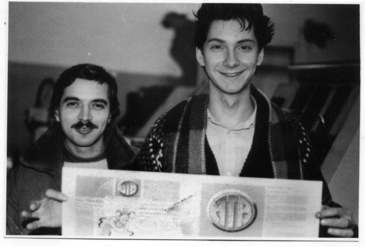
Boris Lozhkin and the first issue of the newspaper “ATV”
Falsified education
An interesting fact in the biography of Boris Lozhkin was discovered by the newspaper “Ekspres”. According to their information, the data he indicated in his biography about higher education is not true. The International Institute for Humanization and Development, which was recorded in his biography, simply does not exist in the USA, and his diploma was issued by an educational institution in the Sumy region, which, according to Skelet.Info, does not have an official license from the Ministry of Education.
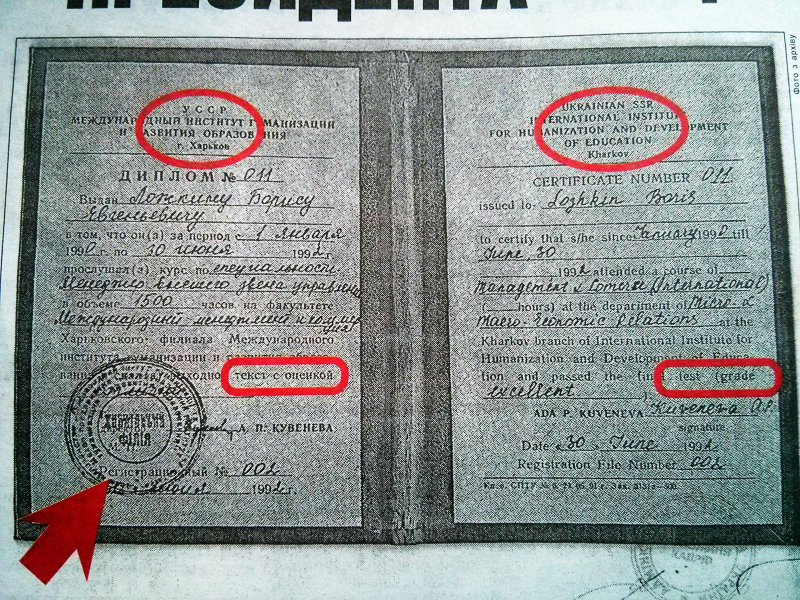
A photocopy of Boris Lozhkin’s “diploma”, certified by the seal of the APU HR department. Judging by the fact that the diploma is printed on plain paper and contains errors, there is no need to talk about the quality of its “authority”.
A couple of years later, Telenedelya was created on the basis of the ATV newspaper, which, in addition to the television program, also contained “piquant” stories about famous Ukrainians. In order to attract the public, the first issue of the newspaper was even free, it was handed out in a square in Kharkov. Three months after the creation of this project, investors returned all their money, and two years later it was already published in a million copies.
Nine years later, Boris Lozhkin entered the Russian market, launching 20 regional enterprises publishing the magazine Telenedelya (in 2013, the publication entered the top 10 largest publications in the CIS).
In order to centrally manage all publications, back in 1994, Boris Evgenievich created the publishing house “Ukrainian Media Holding” (UMH Group). Today, UMH is the leading media holding in Ukraine and is among the top 15 largest media companies operating in the post-Soviet space.
The holding includes:
online publications: Korrespondent.net; Forbes.ua; Vogue.ua; football.ua; bigmir)net; I.ua; Tochka.net; Dengi.ua; KP.ua; Aif.ua; Tv.ua; Vgorode.ua; iSport.ua; Gloss.ua; Smak.ua;
radio stations: Autoradio; Retro FM; Nashe Radio; Europa Plus; Voice of the Capital; Lounge FM; Jam FM; Radio Friday;
Publishing business: Forbes; Vogue; Correspondent; Telenedelya; Football; Komsomolskaya Pravda; Arguments and Facts; Behind the Wheel.
At first glance, everything looks cloudless and transparent, but if you consider that now all these publications are working for the benefit of the “family” and its cronies (like the fugitive ex-Prime Minister Sergei Arbuzov or the leader of the public movement “Ukrainian Choice” Viktor Medvedchuk), everything becomes not so “rosy”.
Boris Lozhkin – UMH – Sergey Kurchenko
In November 2012, journalists from Forbes Ukraine wrote a provocative investigative article about the “freshly baked” young oligarch Sergei Kurchenko, who in just a few years managed to take control of half of the Ukrainian liquefied gas market. There were few positive words about Kurchenko in this article. In essence, it accused him of tax evasion and also linked him to Artem, the son of the infamous Prosecutor General Viktor Pshonka. After the article was published on the website, the offended Sergei Vitalievich came to Lozhkin for a showdown, insisting that the article was untrue and should not be published, however, it was published anyway. Six months later, probably in order to avoid similar compromising materials about him, the VETEK company, controlled by Kurchenko, bought UMH for a colossal sum (according to information Skeleton.Info — about 350 million dollars).
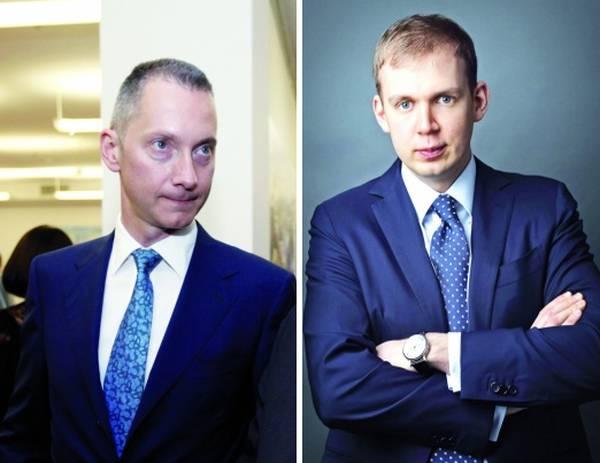
It gets more interesting: in his declaration, Lozhkin did not indicate the amount of income expected from the sale of UMH. There are two possible options here: either Boris Yevgenyevich is simply evading taxes on a multi-million dollar deal, or this was a clever scheme to cover up another shadowy scam to legalize Sergey Kurchenko’s income. In April 2015, after a new team came to power and Lozhkin was appointed head of the Presidential Administration of Ukraine, Sergey Vitalievich was put on the international wanted list, among other things, because of the “criminal mechanisms” that were used to purchase UMH.
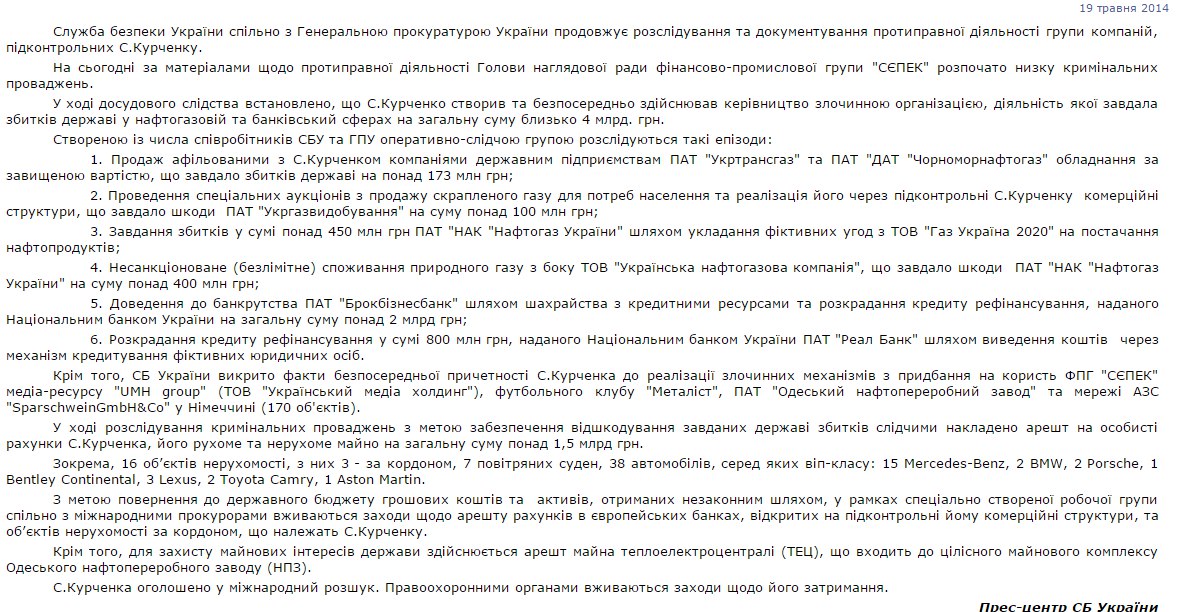
Boris Lozhkin. How to deceive the state for $160 million and become the head of the Presidential Administration of Ukraine
According to the SBU version, Kurchenko used “criminal schemes”, but not a word was said about Lozhkin’s role, because by a lucky coincidence, it was at this moment that Borys Yevgenyevich became the head of the Presidential Administration of Ukraine. And it is much more difficult for investigators to interrogate a famous official than a “former” businessman. The SBU press center stated that the deal was formalized for the sale of the “Ukrainian Media Holding”, but the fact is that the owner of this enterprise did not change after the Lozhkin-Kurchenko deal. What’s the matter, you ask? The fact is that, according to Ukrainian documentation, Lozhkin never directly owned UMH Group. All of Borys Yevgenyevich’s assets were managed by a certain Dutch company with a similar name, United Media Holding NV, and it is noteworthy that Lozhkin worked there only as an interim director.
In turn, this Dutch company was owned by a company based in Cyprus, UMH Group Public Limited, whose owners were kept strictly confidential.
According to the latest information, this enterprise was owned by a company located in the British Virgin Islands, Integrity International Holding Limited. Incidentally, several current people’s deputies are also associated with this company, as well as the current head of the Dnipropetrovsk region, Valentin Reznicenko.
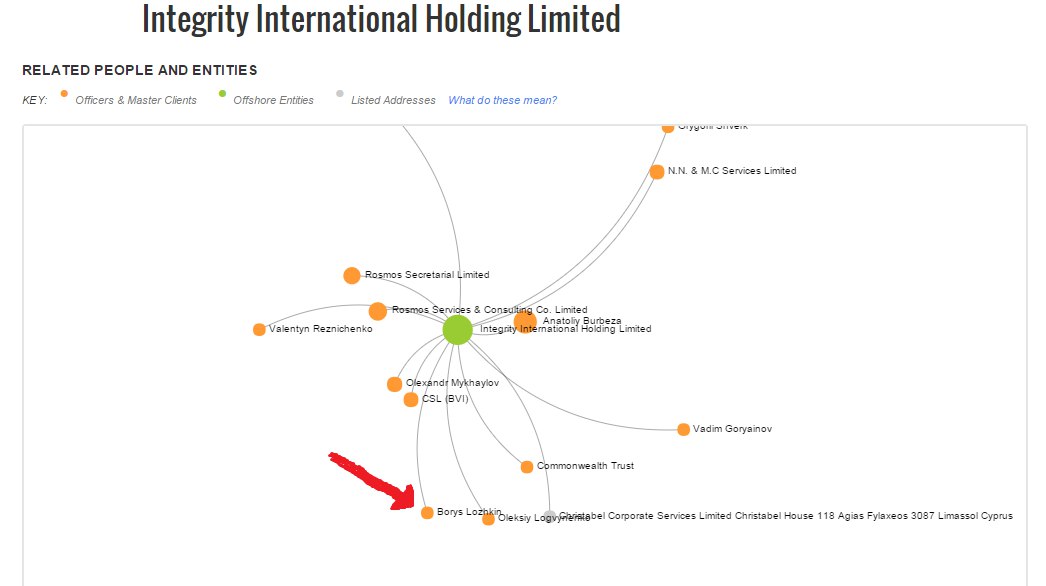
Scheme Linking Lozhkin to Hidden Offshores in the Virgin Islands
Lozhkin’s entire scheme consisted of the fact that the companies in the British Virgin Islands are controlled by the Cypriot UMH Group, which in turn supervises the Dutch company, and it then controls the Ukrainian UMH. Legally, this scheme allows for virtually no taxes on profits.
Returning to Lozhkin’s income declaration for 2013, it should be said that, unlike the detailed data on the earnings of his family members, there is not a word about his personal “hidden” capital. Apparently, Boris Evgenievich did not expect that they would be able to find them in distant tropical countries, because they are so “carefully” hidden. When filling out his declaration, Lozhkin “tactfully” kept silent about the fact that he is the owner of a company located far across the ocean, and this is already a crime, because, according to the new anti-corruption laws, for such a thing one is immediately dismissed. However, Lozhkin and his long-time companion Poroshenko are still in power, and, apparently, are not going anywhere. It is not known for sure whether Boris Evgenievich is part of Kurchenko’s machinations with state banks, but, being a far from stupid person, he could not help but notice that he was drawn into the “big game”. Although, perhaps because of this, he has now gone into politics, which in Ukraine gives him at least some immunity, at least until a new team comes to power.
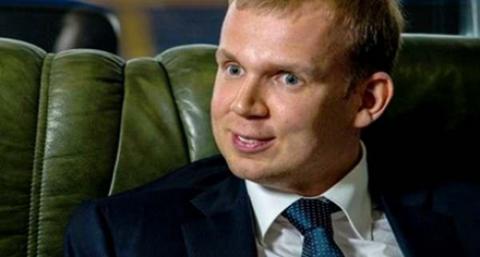
Sergey Kurchenko
Boris Lozhkin and Sergey Kurchenko: “Credit for Two”
Digging deeper, it turned out that Lozhkin is directly connected to Kurchenko’s machinations, because he himself helped him buy UMH and not only prepared the deal, but even got into credit obligations. Investigating the financial flows of Sergey Kurchenko, journalists discovered the fact that he spent not his own money, but state money, to buy the holding.
In 2013, the 100% state-owned Ukreximbank “unexpectedly” issued a loan of a whopping $160 million to one of the companies controlled by Sergei Kurchenko. Incidentally, this amount was 60% of all loans issued by the bank in 2013. What does Lozhkin have to do with it, you ask? The fact is that on the day this loan was issued to the company, its director was Boris Lozhkin. The collateral for the loan was to be shares of enterprises that were part of Boris Yevgenyevich’s business system, namely shares of the Dutch company United Media Holding NV, which only partially owns UMH Group. The catch is that these shares are absolutely worthless without Ukrainian assets. It should also be noted that when issuing a loan, the bank evaluates the creditworthiness of the enterprise by taking into account its debts and assets. So, at the time when Lozhkin planned to take a loan for Kurchenko, his enterprises already owed 70 million (i.e. they had already pledged property for 140 million). Therefore, in order to receive another loan, Sergey Vitalievich and Boris Evgenievich had to prove to the bank that UMH shares were worth at least 460 million dollars. How they managed to convince Ukreximbank to issue them funds becomes clear only if we remember who was in power at the time (Yanukovych & Azarov Co). Among other things, they were greatly helped by Oleksandr Klimenko, the then Minister of Revenue and Duties, under whom his department began to be called the “Ministry of Raiding and Corruption”.
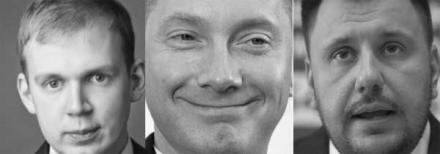
Be that as it may, under the noise of the revolution that began in Ukraine, Lozhkin and Kurchenko together received $160 million from the state bank, which were immediately sent to accounts “overseas”. It would seem that since there are credit obligations, it is possible to seize shares that should have reimbursed the entire amount issued by the bank, but here is the problem: immediately after the sale of UMH to Kurchenko, his shares fell in price by almost 10 times, and now instead of the declared $450 million, they are worth only $50 million. In this situation, the sad Ukreximbank can only hope for the “conscience” of Sergei Vitalievich and his love for the Motherland, which can motivate him to repay the gigantic loan. However, judging by the fact that the law enforcement agencies of this very “Rodina” are actively looking for him, it is not worth waiting for the loan to be repaid.
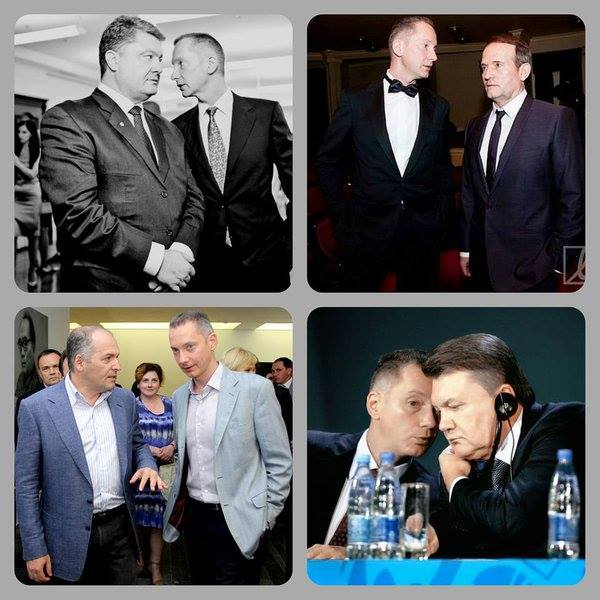
And Lozhkin, who made a fortune on this deal, can continue to “cool off” under the wing of the current president Poroshenko. And no matter what they say, he could not help but understand that he himself took out a loan from the bank so that Serhiy Kurchenko could buy his “brainchild” United Media Holding.
Dmitry Samofalov, for Skelet.Info
ON TOPIC: Boris Lozhkin sold media holding and lost his post as head of the Administration
Subscribe to our channels in Telegram, Facebook, CONT, VK And Yandex Zen — only dossiers, biographies and dirt on Ukrainian officials, businessmen, politicians from the section CRYPT!









